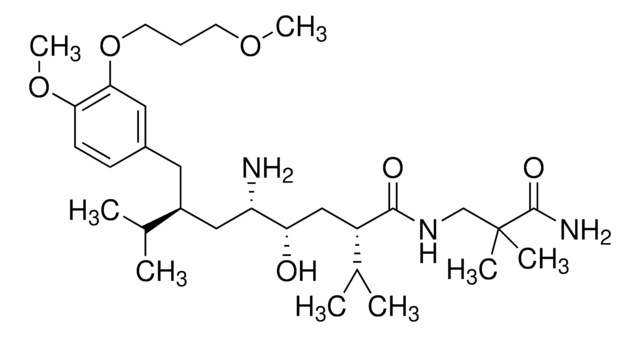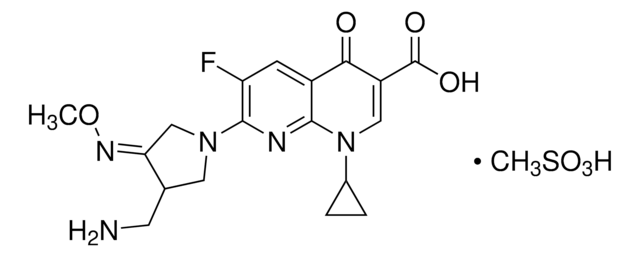SML1495
Suprofen
≥98% (HPLC)
Sinónimos:
(±)-Suprofen, 2-[4-(Thiophene-2-carbonyl)phenyl]propanoic acid, NSC 303611, p-(2-Thenoyl)hydratropic acid, α-Methyl-p-(2-thenoyl)phenylacetic acid
About This Item
Productos recomendados
Quality Level
assay
≥98% (HPLC)
form
powder
color
white to beige
solubility
DMSO: 20 mg/mL, clear
storage temp.
room temp
SMILES string
CC(C(O)=O)c1ccc(cc1)C(=O)c2cccs2
InChI
1S/C14H12O3S/c1-9(14(16)17)10-4-6-11(7-5-10)13(15)12-3-2-8-18-12/h2-9H,1H3,(H,16,17)
InChI key
MDKGKXOCJGEUJW-UHFFFAOYSA-N
Gene Information
human ... PTGS1(5742) , PTGS2(5743)
¿Está buscando productos similares? Visita Guía de comparación de productos
Application
Biochem/physiol Actions
signalword
Danger
hcodes
Hazard Classifications
Acute Tox. 3 Oral
Storage Class
6.1C - Combustible acute toxic Cat.3 / toxic compounds or compounds which causing chronic effects
wgk_germany
WGK 3
flash_point_f
Not applicable
flash_point_c
Not applicable
Certificados de análisis (COA)
Busque Certificados de análisis (COA) introduciendo el número de lote del producto. Los números de lote se encuentran en la etiqueta del producto después de las palabras «Lot» o «Batch»
¿Ya tiene este producto?
Encuentre la documentación para los productos que ha comprado recientemente en la Biblioteca de documentos.
Nuestro equipo de científicos tiene experiencia en todas las áreas de investigación: Ciencias de la vida, Ciencia de los materiales, Síntesis química, Cromatografía, Analítica y muchas otras.
Póngase en contacto con el Servicio técnico









